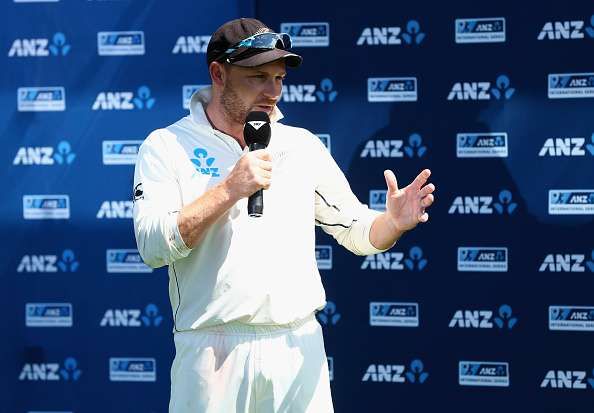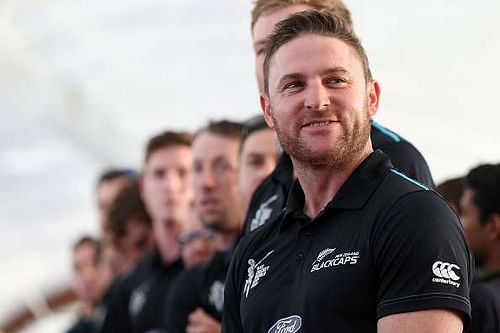
Brendon McCullum's MCC lecture reaffirms his status as an ideal role model of the game
Aggression is a word that’s thrown around a lot in cricket these days. And it goes well with the new clothes that the game has worn in the last decade or so. As cricket has turned shorter, aggression has become the new buzzword. You’ve to throw caution to the wind when you bat, you’ve to aim for the base of the stumps when you bowl and you’ve to chase like a hare and leap like a cheetah when the ball is around you on the field. These are exactly the things that sell and what the crowds come to see in the match.
But so often has the word ‘aggression’ been given a different guise that one often gets confused what it truly refers to. In a time when playing for cameras has become equally important for players as playing for the team, it is slightly sad to see how the wild celebrations on dismissals, the flowing of expletives in the air and efforts to run down the opposition too have become synonymous with aggression for the cricketers.
In such a scenario, Brendon McCullum’s aggression is just the kind of aggression that the game needs. The batsman who finished his Test career by striking the fastest Test ton ever earlier this year is doing post-retirement what he did the best throughout his career – giving aggression a good name in the game. Invited to give the Cowdrey Spirit of Cricket lecture at Lord's, McCullum came down heavily on the International Cricket Council for being casual with the malaise of corruption in the game. The ex-Kiwi captain, who was a witness in the case of Chris Cairns’ match-fixing trial, hit out at the cricketing body with a straight bat.
Expressed Disappointment with ICC
McCullum was a key witness in the Cairns trial where the former allrounder was found not guilty of perverting the course of justice from a high-profile libel case involving former Indian Premier League chairman Lalit Modi. Referring to his "moral obligation" to give evidence, McCullum said: "I do wish that the ICC had handled my initial approach more professionally." The right-hander launched an attack on the ICC over its handling of witnesses and whistleblowers in the game. "If players cooperate with the authorities and provide the game with a rare and critical insight into the workings of this pernicious influence, then there must surely be something that can be done beyond giving them the maximum ban available," McCullum said
During his time with the national team, McCullum enjoyed the status of being one of the most feared and yet one of the most respected opponents of the game. His ability to step out to the fastest of the bowlers and hit them over their head or over the covers was also complemented by a handshake and a pat on the back of an opponent who performed well. He epitomised the adage of playing hard but playing fair.
The McCullum brand of Aggression

McCullum, the captain, rubbed off his brand of aggression even on his teammates who collectively brought Kiwi cricket up from its state half a decade ago. He moulded a bunch of talented cricketers into a unit who were aggressive in their intent but at the same time played the game with an amazing sense of dignity. The 34-year-old led them all from the front with his swashbuckling batting and equally aggressive fielding.
The best display of it came in the form of Grant Elliot’s gesture of lending a crestfallen Dale Steyn a hand after he struck the pacer for a six to close a tense World Cup semi-final in 2015. It was in complete contrast to an incident that took place in the final when Brad Haddin gave an appalling send off to Martin Guptill. The Australian wicketkeeper later justified it by saying that the Kiwis deserved it because they were too nice and that was making the Australians uncomfortable.
On his approach to captaincy
Speaking at Lord’s, McCullum deconstructed his approach to the game as a captain, which earned him great respect. "We wanted to be respected by our long-suffering fans in New Zealand. We wanted to be respected by our opposition, and before we could demand this we had to learn to respect them," the 34-year-old said.
McCullum leaves the game and its young fans with a unique template of aggression. For too long there was the Australian brand of aggression that believed in disintegrating the opponent mentally through whatever means possible, of which superior cricketing skills was just one of the weapons. McCullum’s aggression is a departure from that notion and has a tinge of Gandhianism in it as his cricket was, and still is, about winning by elevating yourself over the opponent. Through his speech at Lords, McCullum just reaffirmed that true aggression lies in standing by the right and being feared for it, be it in life or on the cricket field.
Not only does the ICC need to pay attention to McCullum’s words to stem the spreading rot of corruption in the game, but cricket itself needs characters like McCullum to keep its image as the Gentleman’s game intact, which is fast vanishing with changing definitions of aggression in the game.
